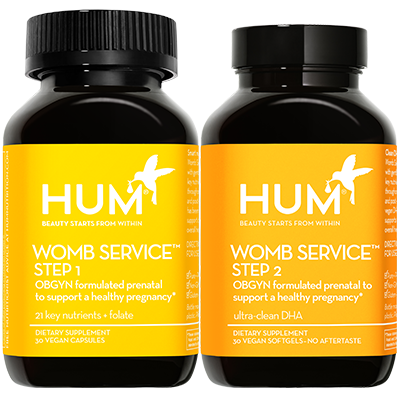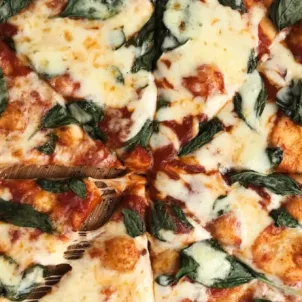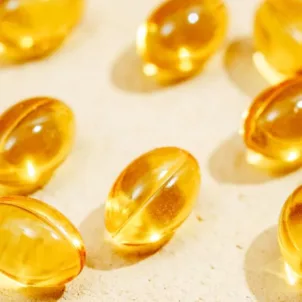So, you’ve welcomed your little one into the world—congrats! You’ll need to keep your strength up if you choose to breastfeed your baby. But while your diet doesn’t need to be quite as strict as it was during pregnancy, there are some foods to avoid while breastfeeding. Nutrition experts explain everything you need to know.
Most women know the importance of being cautious about what they eat, drink, and do while pregnant, but few realize that much of this behavior continues for as long as they are breastfeeding. Even though your pregnancy journey is over, there are still some foods to avoid while breastfeeding. That’s because the bulk of the nutrients that make up a mother’s breast milk come directly from her own diet, meaning some of what she consumes can seep into her breastmilk and be delivered to her growing and still-developing baby.
For this reason, optimal postpartum nutrition is key. “A nutrient-dense diet full of complex carbs that include fiber, healthy fats, and protein, plus adequate hydration, can help heal your body, stave off bone loss, replenish your iron stores, and much, much more,” says Lisa Bruno, RDN, a registered dietitian and owner of Well Done Nutrition. “If you are breastfeeding, you also have to stay conscious of consuming enough calories to support the energy your body is using to produce breast milk, as you might need to eat a little more—about an additional 330 to 400 calories a day—to give you the energy and nutrition to produce milk.”
To help keep your baby healthy and thriving in the months post-birth a nursing mom not only has to be calorie- and nutrient-cautious, but they also have to watch out for certain foods—and drinks—that could be potentially harmful to their baby. Luckily, the nursing period comes with fewer restrictions than the pregnancy period, but there are still a few that should be avoided or, at best, kept to a minimum, for the optimal health and safety of your growing baby. Here, nutrition pros share the beverages and foods to avoid while breastfeeding.
What Not to Eat (or Drink) While Breastfeeding, According to Experts
1. Alcohol
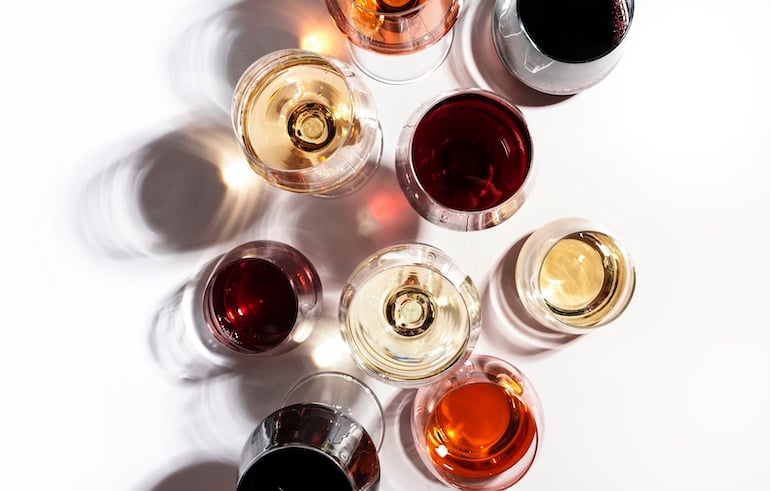
Can you drink while breastfeeding? You’re already accustomed to avoiding alcohol during pregnancy, as it’s been linked to a myriad of health problems that could occur in a developing fetus, per the Centers for Disease Control and Prevention (CDC), but you may not have realized that imbibing can also be harmful while you’re breastfeeding. “Alcohol is transferred into breast milk, and the effects of alcohol on a breastfeeding infant are directly related to the amount mom consumes,” warns Elizabeth Ward, RDN, author of Expect the Best, Your Guide to Healthy Eating Before, During, and After Pregnancy. “The more a mother drinks, the higher the alcohol level of her breast milk.” The CDC warns that consuming more than one drink per day while breastfeeding could have a negative impact on an infant’s development, growth, and sleep patterns.
You might have heard of the old “pump and dump” technique, which involves imbibing and then “dumping” your breastmilk out either by pumping or manually expressing it out and getting rid of the milk. According to the CDC, this technique does not reduce the amount of alcohol that is present in your body or milk any quicker than if you let it digest naturally.
It’s worth pointing out, however, that most medical practitioners agree that an occasional drink is likely safe, as long as you’re cautious about the amount and timing. “Alcohol levels are usually highest in breast milk 30 to 60 minutes after an alcoholic beverage is consumed and can be generally detected in breast milk for about two to three hours per drink after it is consumed,” says Bruno.
2. Coffee and Caffeine
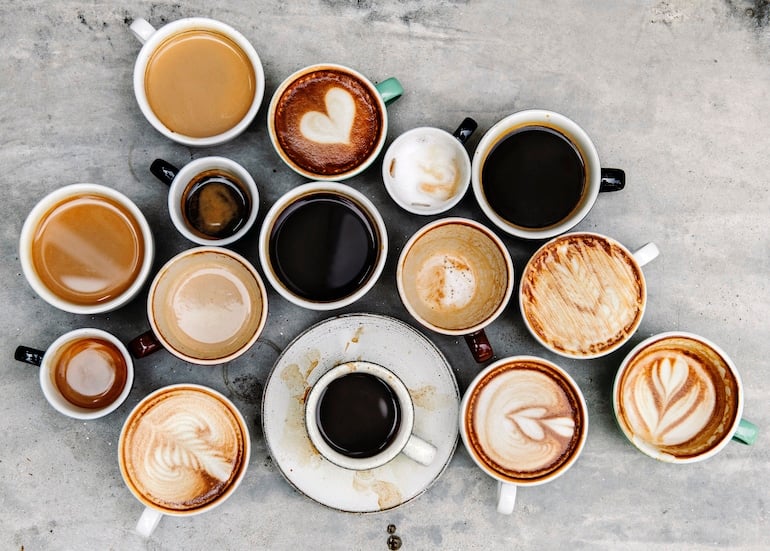
Your morning cup of joe is probably not something you’re willing to give up easily—especially during those foggy first few months of newborn life where sleep is hard to come by. So, can you drink coffee while breastfeeding? While you don’t have to totally eliminate coffee and caffeine while breastfeeding, it is a good idea to monitor your intake. Research published in the peer-reviewed journal Swiss Medical Weekly has shown that some caffeine can end up in breastmilk. This can be an issue, according to Bruno, because babies have a hard time breaking down caffeine. “It can accumulate, and in return, your baby could be irritable and have trouble sleeping,” she says.
The CDC recommends limiting caffeine intake to no more than 200-300 mg daily, equivalent to about two to three cups of coffee, depending on the strength.
3. Some Seafood
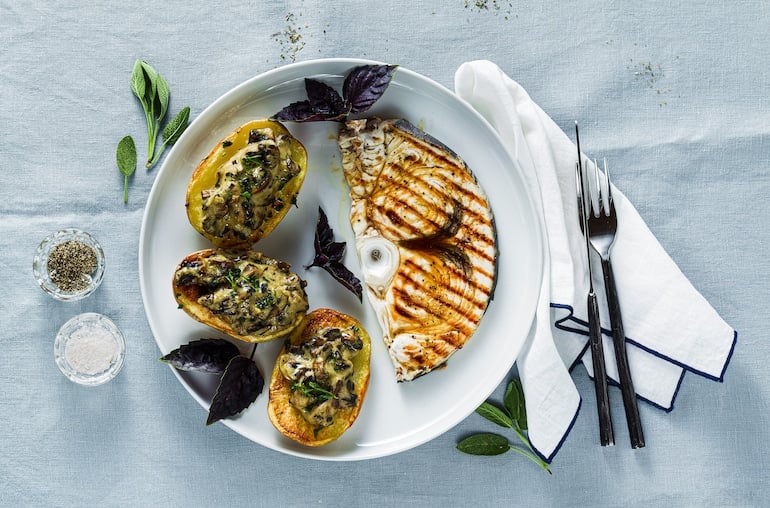
Fish can be a nutrient-rich protein that can be quite beneficial for both mom and baby. “Specifically, two types of omega-3 fatty acids found in fish are important for brain development in infants—docosahexaenoic acid (DHA) and eicosapentaenoic acid (EPA),” says Bruno. But can you eat seafood while breastfeeding? Unfortunately, certain fish contain more mercury than others, so it’s a good idea to be choosy when selecting which fish to eat while pregnant or nursing. “Mercury is a metal that can be toxic and acute high-level exposure could affect your infant’s central nervous system,” says Bruno. She recommends avoiding fish such as, bigeye tuna, king mackerel, marlin, shark, swordfish, and tilefish. Instead, Bruno suggests choosing fish like salmon, light canned tuna, Atlantic mackerel, catfish, clams, crab, crawfish, flounder, haddock, mullet, oysters, and pollock.
We know what you’re thinking: Can I eat sushi while breastfeeding? Good news—sushi and sashimi are safe to eat while breastfeeding if you’re choosing high-quality, low-mercury fish.
4. Certain Herbal Supplements
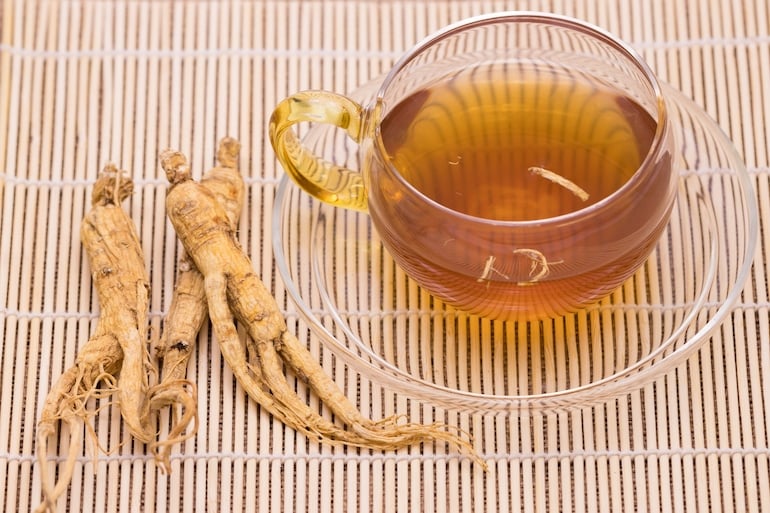
During pregnancy, you may have been instructed by your healthcare provider about the best vitamins to take and avoid while pregnant, including a prenatal vitamin. But there are certain herbal supplements you also want to avoid while breastfeeding because research is fairly inconclusive as to their safety.
These are a few herbs to avoid while breastfeeding, according to Nicole M. Avena, Ph.D., Assistant Professor of Neuroscience at Mount Sinai School of Medicine and Visiting Professor of Health Psychology at Princeton University and author of What to Eat When You Want to Get Pregnant:
- Comfrey
- Coltsfoot
- Borage
- Black cohosh
- Feverfew
- Ginseng
- Licorice root
- Kava kava
“In addition to causing liver damage and possibly cancer, the PAs (pyrrolizidine alkaloids) in comfrey might also cause birth defects,” she says. “As for coltsfoot: it can enter your breastmilk and cause liver damage to your baby, so you should avoid it until you’re no longer nursing.” Licorice and licorice extract are “generally recognized as safe” (GRAS) as foods by the U.S. Food and Drug Administration, however, Dr. Avena warns that long-term, excessive use of licorice can cause hypertension, hypokalemia, and disturbances of adrenal hormones, and therefore should probably be avoided during nursing.
The best thing you can do to protect yourself and your baby while you’re nursing is to double-check with your primary care provider before taking any type of herbal supplement while you’re nursing.
5. Spice and Garlic
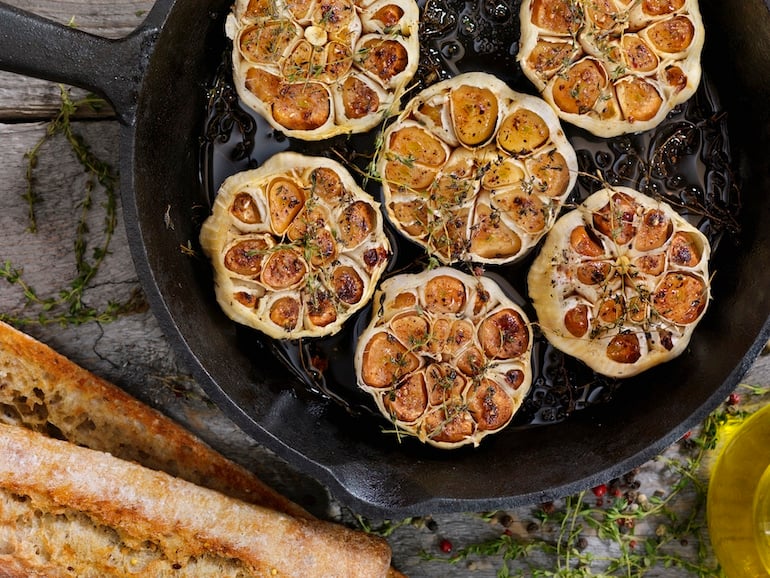
If you love flavor in your food, garlic and spices are probably kitchen-cabinet staples, but you may want to cut back on the amount you use in the food you’re eating while you’re still breastfeeding. Bridget Swinney, MS, RDN, LD, author of Eating Expectantly and blogger at Eat Right Mama, warns that strong-flavored foods like garlic, onion, and sulfur-containing vegetables can sometimes alter the taste of your breastmilk, which may be a bit of a turnoff to your tiny consumer. If you’re chowing down on strong-flavored spices and your little one doesn’t seem to care, there’s no reason to stop. But if you’re eating spices and garlic and breastfeeding and your baby is experiencing tummy troubles or having difficulty sleeping, consider cutting these foods out to see if it makes a difference.
The Takeaway
The good news is that there are fewer foods to avoid while breastfeeding than there were during pregnancy. Nutrition during this time should be focused on what to add to your diet, including some of these best foods for breastfeeding. Your diet may also benefit from additions like lactation cookies that can help to boost your milk supply.
Keep in mind that similar to pregnancy, it’s not always possible to meet all of your nutrient needs through nutrition. Many women benefit from continuing to take their prenatal vitamins during the postpartum period. HUM’s Womb Service Prenatal + DHA Multi has been specifically formulated to support all of your nutrition needs from pre-pregnancy through postnatal.
